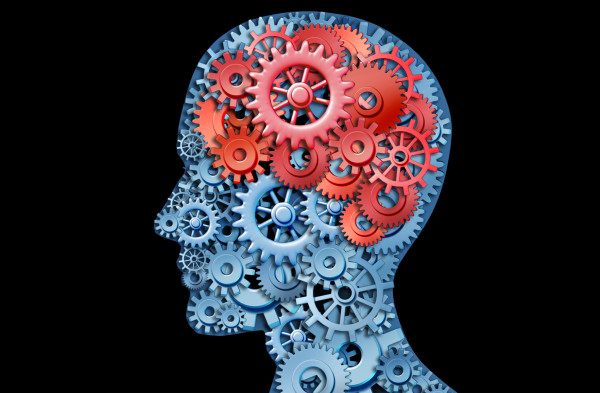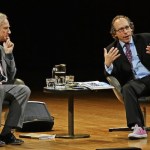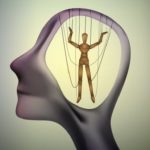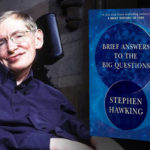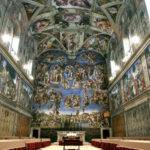Free-Thinking: Doctrine or Illusion?
by Dr. Stacy Trasancos
Filed under Anthropology
Recently there was an excellent question in the Strange Notions comment boxes from Rob Tish. He wanted to know what the Bible means when it says God created man in His own image: "If God is so fundamentally and essentially different from us, then in what sense are we made in His image?"
In a word: We are free-thinkers.
Since invoking that word requires some explanation, the response is three-fold. First is the answer to Rob's question, with explanation and reference to the Catechism of the Catholic Church. Second is a summary of atheists' views on this matter, with explanation and reference to popular atheist scientists. Third are some questions.
First: What Made in God's Image Means
The Christian doctrine of free-thinking is tied to the revelations of the Holy Trinity and the Incarnation, and it explains why humans have intellect and free will, that is, the ability to freely decide what to think.
Some background: In trying to understand the revelation of the Holy Trinity, theologians had to define the word "person" more precisely. Historically, the Latin word “persōna,” after the corresponding use of the Hellenistic Greek πρόσωπον (prosopon), meant a mask on a character in a play or a juridical entity. Christian theology clarified the meaning of "person" dating back to the third century writings of Tertullian (Adversus Praxean) and the sixth century writings of Boethius (De Duab. Nat. as referenced by St. Aquinas, ST I.29.1.1).
"Person" was defined as “an individual substance of a rational nature” and the theologians applied it to an understanding of the Holy Trinity, One God and three Persons. Since the Father, Son, and Holy Spirit share fully in the Divine Nature, yet each is an individual, then they are Persons, each "an individual substance with a rational nature" but also united as One God.
Theologians also worked out the order of the processions of the Three Persons of the Trinity, and it has significance for the understanding of humans. The Son proceeds from the Father as an act of divine intellect, somewhat like a word is conceived in the mind. Christ is the Word, the Logos, the Truth personified. From the Father and Son together as one substance the Holy Spirit proceeds as an act of divine will, Love personified. The Three Persons are in perfect, eternal communion.
In Genesis, God said, "Let us make man, wearing our own image and likeness." This divine image is, thus, present in humans, and the human person is "an individual substance of a rational nature" too. The creature is not equal to the Creator though. Humans are rational, but they are not omniscient, almighty, or able to create out of nothing.
"The divine image is present in every man. It shines forth in the communion of persons, in the likeness of the unity of the divine persons among themselves." (Catechism of the Catholic Church 1702)
Because we bear this likeness, we bear a natural yearning for the organization of the Holy Trinity. We have the spiritual powers of intellect and will, which instill in us the natural reciprocal desires to love and be loved, to know and be known, to learn and make choices, to seek what is good and to abhor what is evil.
We also naturally desire to belong to our families and communities—many persons united as one entity. The more people freely give, receive, and search for good, the more they are united, the more they learn, the more the human race progresses.
"By virtue of his soul and his spiritual powers of intellect and will, man is endowed with freedom, an 'outstanding manifestation of the divine image.'" (CCC 1705)
Families are the most intimate reflection of the Holy Trinity, two become one and born of their love is a new person. This is the basis of arguments against laws of man that break these natural, divine laws. They are disordered laws that break the unity of people, families, and societies, and diminish the freedom and dignity of each person.
"By his reason, man recognizes the voice of God which urges him "to do what is good and avoid what is evil." Everyone is obliged to follow this law, which makes itself heard in conscience and is fulfilled in the love of God and of neighbor. Living a moral life bears witness to the dignity of the person." (CCC 1706)
The Second Person of the Blessed Trinity became man to heal the union of mankind with God. That redemption is available to anyone who freely chooses to accept it.
"It is in Christ, 'the image of the invisible God,' that man has been created 'in the image and likeness' of the Creator. It is in Christ, Redeemer and Savior, that the divine image, disfigured in man by the first sin, has been restored to its original beauty and ennobled by the grace of God." (CCC 1701)
This means we are made to search for God, as every human culture in recorded history has done. It means we are made to form communities and to seek just laws, as cultures also sought to do even though they all have failed to do it perfectly. This also means that we are made to search for what is true and good, and to be united with God in Heaven where we find perfection. Not only is there a logic to this doctrine, there is a primal beauty.
"Endowed with 'a spiritual and immortal' soul, the human person is 'the only creature on earth that God has willed for its own sake.' From his conception, he is destined for eternal beatitude.
The human person participates in the light and power of the divine Spirit. By his reason, he is capable of understanding the order of things established by the Creator. By free will, he is capable of directing himself toward his true good. He finds his perfection 'in seeking and loving what is true and good.'" (CCC 1703-1704)
Of course, because we possess the power of free will and intellect, humans can make the choice to reject faith in what God has revealed and turn away from it.
Second: Atheism and Free-Thinking
Most people probably think "free-thinking" is an atheist term, but the idea was more or less borrowed. It emerged in the 1700's among groups who rejected Christianity. The rationalist sect, prominent from the early 18th century, typically capitalized the word as a label for themselves. "Free-thinker" is defined today as a label for a person who professes independence of thought, withholds assent to widely held beliefs or ideas, and refuses to submit his or her reason to the control of authority in matters of religious belief. (Oxford English Dictionary)
The James Hastings 2003 Encyclopedia of Religion says that Free-thinkers strive to build their opinions on the basis of facts, scientific inquiry, and logical principles, independent of any logical fallacies or the intellectually limiting effects of authority, confirmation bias, cognitive bias, conventional wisdom, popular culture, prejudice, sectarianism, tradition, urban legend, and all other dogmas.
While all of that sounds impressive on the surface, the rejection of Christian doctrine has its logical implications. Without acknowledging the soul of man created in the image of God, there is no basis to acknowledge the spiritual powers of intellect and free will. Some of the most respected modern atheists have followed atheism to its logical conclusion and admitted as much.
"The facts tell us that free will is an illusion." (Sam Harris, neuroscientist)
"Since, as far as physics is concerned, we are all just particles, then this would seem to make free will an illusion indeed." (Dr. Victor Stenger, physicist)
"I would like to convince biologists that a belief in free will is nothing other than a continuing belief in vitalism (or, as I say, a belief in magic)." (Dr. Anthony Cashmore, biologist)
"It is hard to imagine how free will can operate if our behavior is determined by physical law, so it seems that we are no more than biological machines and that free will is just an illusion." (Stephen Hawking and Leonard Mlodinow, cosmologist and physicist)
There is, according to them, no supernatural realm and thus, no soul. There is only the physical body. The brain runs its program like a computer obeying the laws of physics, and consciousness, if there is such a thing, is an emergent and measurable property of the brain-machine.
Without the power for a person to freely chose what to think, there is no basis to claim the power of actual free-thought. That is not only an "intellectually limiting effect" (from authority figures nonetheless), it is a fatal contradiction of the atheistic free-thinking identity.
Third: Where Does That Leave You?
It gets back to Rob's question and the importance of the doctrine of the Holy Trinity, the Incarnation, and the definition of "person" made in the image and likeness of God.
If free-thinking is an illusion, then aren't intellectual pursuits illusions too? Isn't searching for truth like trying to lift yourself up by your bootstraps? You are free to reach down and do it, tug and tug until you are exhausted, but you get nowhere except where the laws of physics land you if your feet move out from under you. Are your thoughts, then, in vain?
If free-thinking is a human power of the soul because the human person is made in the image and likeness of God, then aren't intellectual pursuits more like reaching for something beyond yourself while planting your boots firmly on the ground? Searching for truth, guided by an assent in faith, is a reasonable way to understand more about yourself, your world, your purpose, and your origin. Does that mean your thoughts, then, are imprisoned?
Perhaps an atheist will follow up with answers to these questions, including an explanation about how there can be actual free thought if free will is an illusion—with particular emphasis on why it is reasonable to believe the intellectual conclusions of scientists who claim to have no free will.
Related Posts
Note: Our goal is to cultivate serious and respectful dialogue. While it's OK to disagree—even encouraged!—any snarky, offensive, or off-topic comments will be deleted. Before commenting please read the Commenting Rules and Tips. If you're having trouble commenting, read the Commenting Instructions.




